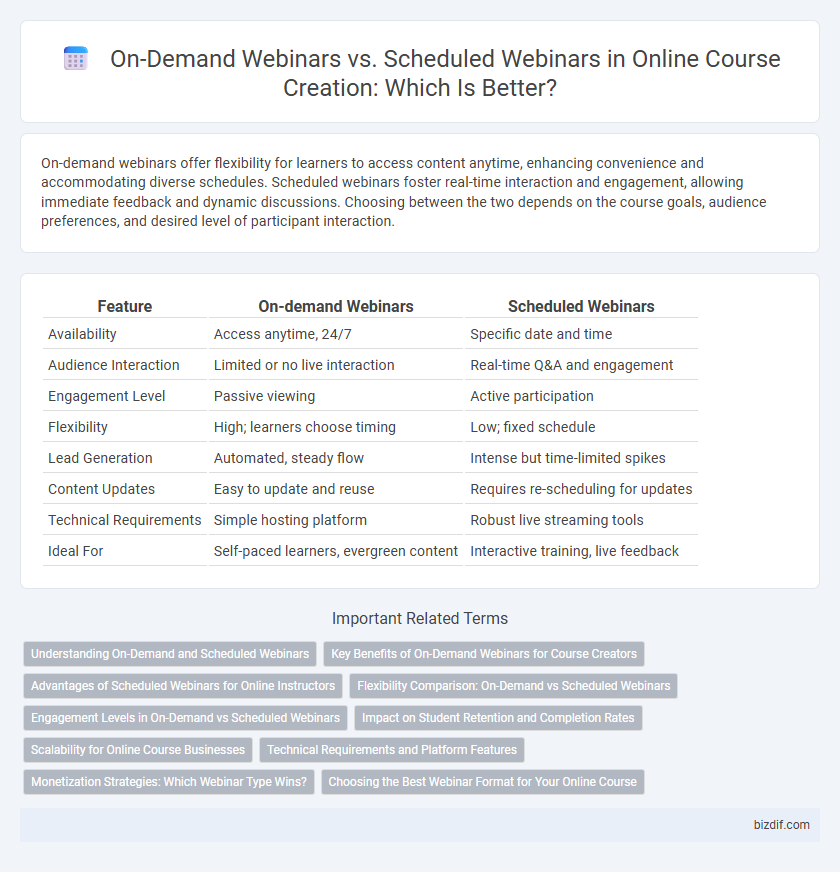On-demand webinars offer flexibility for learners to access content anytime, enhancing convenience and accommodating diverse schedules. Scheduled webinars foster real-time interaction and engagement, allowing immediate feedback and dynamic discussions. Choosing between the two depends on the course goals, audience preferences, and desired level of participant interaction.
Table of Comparison
| Feature | On-demand Webinars | Scheduled Webinars |
|---|---|---|
| Availability | Access anytime, 24/7 | Specific date and time |
| Audience Interaction | Limited or no live interaction | Real-time Q&A and engagement |
| Engagement Level | Passive viewing | Active participation |
| Flexibility | High; learners choose timing | Low; fixed schedule |
| Lead Generation | Automated, steady flow | Intense but time-limited spikes |
| Content Updates | Easy to update and reuse | Requires re-scheduling for updates |
| Technical Requirements | Simple hosting platform | Robust live streaming tools |
| Ideal For | Self-paced learners, evergreen content | Interactive training, live feedback |
Understanding On-Demand and Scheduled Webinars
On-demand webinars provide learners the flexibility to access content anytime, increasing accessibility and engagement for diverse audiences. Scheduled webinars, by contrast, offer real-time interaction and immediate feedback, fostering a dynamic learning environment. Choosing between on-demand and scheduled webinars depends on course goals, audience preferences, and the need for live participation versus self-paced learning.
Key Benefits of On-Demand Webinars for Course Creators
On-demand webinars offer course creators unparalleled flexibility by allowing learners to access content anytime, increasing engagement and accommodating diverse schedules. These webinars reduce logistical challenges and eliminate the need for live hosting, enabling scalable and consistent content delivery. Enhanced analytics from on-demand sessions provide valuable insights into viewer behavior, aiding in course optimization and targeted marketing strategies.
Advantages of Scheduled Webinars for Online Instructors
Scheduled webinars offer online instructors the advantage of fostering real-time interaction and engagement, enhancing learner accountability through fixed times that encourage attendance. They enable precise content delivery tailored to live audience feedback, promoting active participation and immediate clarification of doubts. The structured format aids in building a committed learning community, improving course completion rates and overall learner satisfaction.
Flexibility Comparison: On-Demand vs Scheduled Webinars
On-demand webinars offer unmatched flexibility by allowing viewers to access content anytime, accommodating diverse schedules and learning paces. Scheduled webinars require attendees to join at specific times, which can enhance real-time interaction but limits convenience for global audiences. Choosing between these formats depends on whether prioritizing participant flexibility or live engagement is more critical for the course objectives.
Engagement Levels in On-Demand vs Scheduled Webinars
Scheduled webinars typically generate higher engagement levels due to real-time interaction and urgency, which encourages active participation and immediate feedback from attendees. On-demand webinars provide flexibility, allowing users to access content at their convenience, but they often experience lower engagement rates since the interactive element is absent. Incorporating features like live Q&A in scheduled webinars enhances attendee retention and satisfaction compared to passive on-demand viewing.
Impact on Student Retention and Completion Rates
On-demand webinars offer flexibility that enhances student retention by allowing learners to access content at their convenience, leading to higher completion rates. Scheduled webinars create a sense of urgency and community engagement, which can motivate timely participation but may result in lower completion due to time constraints. Data shows on-demand formats increase course completion by up to 30%, while scheduled sessions improve engagement through real-time interaction.
Scalability for Online Course Businesses
On-demand webinars offer superior scalability for online course businesses by allowing unlimited access to course content without the constraints of fixed timing, enabling learners worldwide to engage at their convenience. Scheduled webinars require real-time attendance, limiting scalability due to predefined time slots that may not suit global audiences or varying schedules. Leveraging on-demand webinars maximizes course reach, reduces resource allocation for repeated sessions, and supports sustained learner engagement across diverse time zones.
Technical Requirements and Platform Features
On-demand webinars offer flexibility by allowing participants to access content anytime, requiring platforms with strong video hosting capabilities, seamless playback, and integrated analytics for tracking viewer engagement. Scheduled webinars demand robust real-time communication features such as live chat, Q&A, polling, and reliable streaming infrastructure to support synchronous interaction and audience participation. Platforms supporting scheduled webinars often include automated reminders, registration management, and live technical support to ensure smooth event execution and enhance user experience.
Monetization Strategies: Which Webinar Type Wins?
On-demand webinars offer continuous revenue potential by allowing viewers to access content anytime, maximizing sales without time constraints. Scheduled webinars create urgency and exclusivity, often driving higher live engagement and immediate conversions through limited-time offers. Monetization success depends on aligning the webinar format with target audience behavior and product type, but on-demand formats typically generate more consistent, long-term income streams.
Choosing the Best Webinar Format for Your Online Course
On-demand webinars offer flexibility and convenience, allowing learners to access content anytime, which boosts engagement and course completion rates. Scheduled webinars foster real-time interaction and community building, enhancing learner engagement and providing instant feedback opportunities. Selecting the right format depends on your course objectives, audience availability, and the level of interactivity you aim to achieve.
On-demand webinars vs Scheduled webinars Infographic

 bizdif.com
bizdif.com